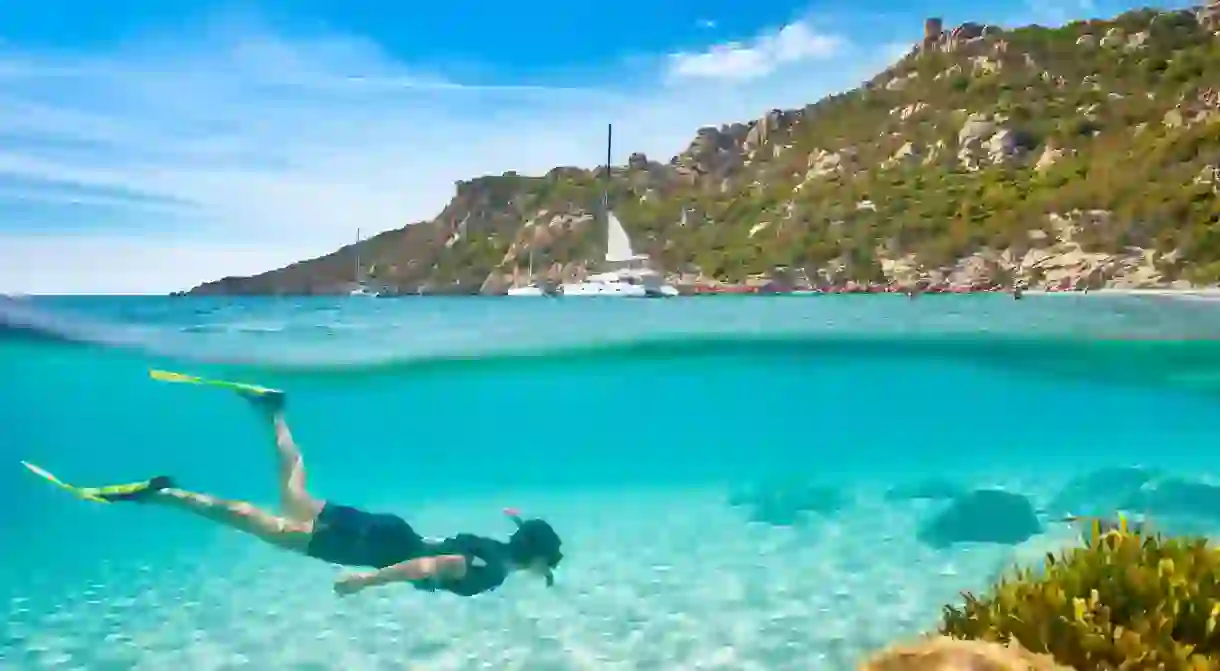The Top Reasons to Visit Corsica

Wedged between France and Italy – and with Sardinia to its south – Corsica may have belonged to France for over 200 years but it still retains some of its Italian heritage. As the fourth-largest island in the Mediterranean, Corsica is lovingly referred to as L’Île de Beauté – the Isle of Beauty – a moniker it certainly lives up to. Visitors here will be enthralled by its stunning natural landscapes, delicious foodie offerings, charming old villages and the selection of stunning beaches to choose from. Still figuring out what to do in Corsica? Here are the top reasons to visit.
Explore coastal gems with the unique Culture Trip’s Sailing Trips.
Try French-Corsican fusion cuisine in Corsica

Corsican’s take their food very seriously. Foodies visiting the island should indulge in classic Corsican dishes like civet de sanglier and agneau Corse, or sample its charcuterie – the island offers French-style cured meats with a distinct Corsican twist. The best place to find local products is at the traditional markets in Ajaccio, Bastia, Île-Rousse and Calvi – which are often held on the weekends.
Go yachting in Corsica

To truly experience Corsica’s beauty first-hand, you need to see it from the waters that surround the island. Delve deeper into the island for a longer spell along with more chances to spot the many species of dolphins and whales that call the seas around Corsica home.
Go hiking in Corsica

Corsica is home to one of the most beautiful hiking trails in the world – the GR20 – so no trip here would be complete without a trek through the remarkable landscape. This is easy enough to achieve, though, as nearly half of the island falls within a park that presents endless hiking trails. Whichever you choose, expect to walk through old villages and giant rock formations – and to pass by secluded coves.
Learn more about the Corsican history

It’s impossible to ignore Corsica’s storied history – one that dates back to the third millennium BC – when you’re visiting the island. Over the years, Italy, France, Germany and the UK have all occupied the island, but it has remained – mostly – under French rule since 1769, which is the same year Napoléon Bonaparte was born in Corsica. To discover more about the island’s history, it’s worth visiting a few of its many museums – including Musée de la Corse – to learn more.
Head out whale and dolphin watching in Corsica
The Pelagos Sanctuary – which covers nearly 90,000sqkm (35,000sqmi) of the marine space that sits around Corsica – is home to a variety of different whales and dolphins. Spend a day on a whale and dolphin watching trip from Corsica for the chance to spot sperm and fin whales or common, bottlenose and striped dolphins. The protected area means Corsica is also a great place for avid divers to see the marine life of the Med up close.
Book tickets to a festival in Corsica

Whatever kind of festival-goer you are, there’s bound to be a one on Corsica for you. Music lovers will delight at Calvi on the Rocks, an electronic music and digital arts festival that is often held in early July – or Porto Latino, a Latin festival of open-air concerts held in early August. Food fiends should check out A Fiera di U Casgiu in Venaco, a rural cheese and local produce fair held in early May – or Fiera di U Vinu in Luri in July, which is a celebration of Corsican wines.
Explore its lush natural beauty in Corsica

There’s a reason Corsica is known as the Isle of Beauty – you’d be hard-pressed to find anywhere else quite like it. Here, expect jagged mountainous terrain contrasted with powdery soft white sand beaches and a vast and varied underwater landscape. The island is also blanketed in lush greenery, among which you’ll find olive groves and grapevines – the latter supplying the island’s wineries.
Drink Corsican wine

A mild climate means Corsica has excellent harvesting conditions, so it’s no wonder it produces a slew of excellent wines. There are three main types of grapes grown here: white grape (Vermentino), red grape (Sangiovese) and unique red (Sciacarello), which is indigenous to Corsica. The best way to sample these is through one of its many wine tasting tours – be sure to pick one that serves its wine alongside local meats and cheeses.
Lounge in beautiful beaches in Corsica

When you’re not hiking, diving or sampling various vinos, it’s time to hit the beach – and luckily, Corsica has many pristine spots to choose from. The popular Calvi beach has glorious views of the Citadel, while the secluded Loto Beach has gorgeous cerulean waters. Palombaggia Beach to the south is lined with pretty pine forests – or head west to the wild Cupabia Beach which you’ll likely have all to yourself.
Embrace the warm weather in Corsica

Being an island in the Mediterranean, it’s a given that Corsica has a temperate climate. During the high season between May and September, temperatures sit at a pleasant 27ºC and the waters are warm enough to swim in. If you’re planning on a hiking holiday here, you’re better to visit in May, June or September, so you can avoid the peak heat of July and August. And if you’re looking for some winter sun, Corsica also has one of the highest annual sunshine records in France.
Did you know – Culture Trip now does bookable, small-group trips? Pick from authentic, immersive Epic Trips, compact and action-packed Mini Trips and sparkling, expansive Sailing Trips.













